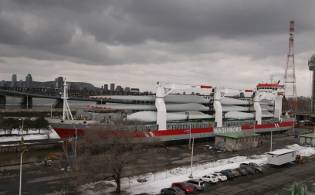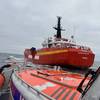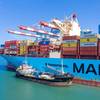
The Avonborg, a BBC chartered vessel, carries wind turbine components loaded in Denmark and destined from Burns Harbor in Indiana This ship was the last oceangoing vessel out of the st lawrence seaway system in 2010 making it the perfect candidate to be the first in the system in 2011. Photo courtesy American Great Lakes Ports Association.
The St. Lawrence Seaway Management Corporation (SLSMC) predicted that cargo shipments would rise by about seven per cent to 39.1 million tonnes for 2011 as it marked the official opening of its 53rd navigation season on March 22 at the St. Lambert Lock.
“Transportation of raw materials serves as a bellwether for the economy as a whole, and despite volatile global economic conditions, we have reason to be cautiously optimistic regarding our various market segments” said SLSMC President and CEO Terence Bowles. “Projections for the 2011 season foresee continued strength in the traditional staple cargoes of grain and iron ore. Shipments of road salt are projected to increase to replenish inventories depleted over a challenging winter season. Project cargo is pegged to rise due in part to continued activity in the oil sands.”
Ian White, President and CEO of the Canadian Wheat Board (CWB) served as the keynote speaker. "The CWB moves between 3 and 3.5 million tonnes of grain to markets through the Seaway each year, making it a vital part of our supply chain," said Mr. White. "Recent announcements on laker construction by a number of companies demonstrate our shared confidence in the Seaway's vibrant future. We look forward to the Seaway continuing to play a critical role in our ability to meet the growing needs of our customers in Europe, Africa and Latin America for the high-quality grain produced by Prairie farmers."
Announcements by Algoma Central Corporation, Canada Steamship Lines, and the Canadian Wheat Board to build state-of-the-art vessels bring about the prospect of fleet renewal, with the addition of vessels that offer leading edge engine technology, fuel efficiency and environmental performance. “This initial investment by our clients, amounting to over $350 million dollars, serves as a strong endorsement for the future of the St. Lawrence Seaway” said SLSMC President and CEO Terence Bowles.
Joining Mr. White on the podium was Stephen Wilkes, a senior executive with Tata Steel, which has operations in Ohio, Indiana, and the Province of Ontario. "Marine transportation plays a key role for the steel industry and its customers, enabling the efficient movement of raw materials, semi-finished, and finished products which directly contribute to the Canadian and U.S. manufacturing base” said Mr. Wilkes. “We need to work together to ensure that all stakeholders recognize the importance of the Great Lakes Seaway System's role in supporting hundreds of thousands of jobs."
Collister Johnson Jr., Administrator of the U.S. Saint Lawrence Seaway Development Corporation, noted that the marine mode continues to be the most energy efficient mode of transportation. “In an era of rapidly rising fuel prices, moving more cargo via the marine mode will serve to lessen our dependence on imported petroleum and bolster our national security” said Johnson.













